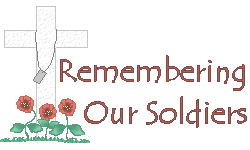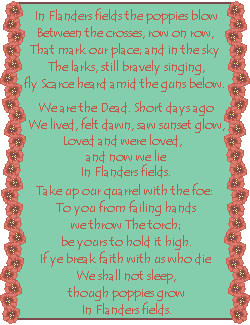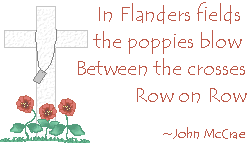
Why do we get Poppies when we give a donation on Veterans
Day?
Flanders Field is a United States
military cemetery near Waregem, Belgium. Buried in this
cemetery
are the bodies of 368 members of the armed forces who
died in World War I (1914-1918).
Canadian poet John McCrae wrote the famous poem, "In
Flanders Fields"

McCrae,
pronounced muh KRAY, John (1872-1918), was a Canadian
physician, soldier, and poet. He
contributed verses to Canadian periodicals before World
War I. But he did not become famous until
1915 when he published "In Flanders Fields" in
Punch, an English magazine. His poems were published
after his death under the title In Flanders Fields, and
Other Poems (1919). ~Above Information from
The World Book Encyclopedia~

In Flanders Fields....
In
Flanders fields the poppies blow
Between the crosses, row on row,
That mark our place; and in the sky
The larks, still bravely singing, fly
Scarce heard amid the guns below.
We are
the Dead. Short days ago
We lived, felt dawn, saw sunset glow,
Loved and were loved, and now we lie
In Flanders fields.
~Written by John McCrae~

Poppy
is the common name for several related groups of flowers.
Since the end of World War I,
Memorial Day has also been Poppy Day. Volunteers sell
small, red artificial poppies in order to help
disabled veterans. In recent years, the custom has grown
in most families to decorate the graves of
loved ones on Memorial Day.
It
has been raised in the Orient since ancient times. The
flowers of poppies are admired for their
delicate beauty and gracefulness. Most kinds are hardy
and easy to cultivate. The tiny seeds are sold
for bird food. They also yield an oil used in preparing
some foods. Poppy seeds are also used as
flavoring. Poppy seeds may be sprinkled on bread and
rolls, or used in filling for cakes.
The common corn poppy grows wild in the grainfields and
grassy meadows of Europe. The most showy
poppy is the large-flowered Oriental poppy. This poppy's
red, orange, white, or salmon blossoms often
have blackish-purple centers. Many poppies are annual
plants that can be grown from seed.
The poppy is one of the flowers of the month of August.

Here
is what Compton's says about The Poppy:
POPPY:
The brightly colored papery flowers of the stately
poppies make them a favorite in rock
gardens and borders. The single-blossomed kinds range in
color from white, pink, and rose to yellow,
orange, and scarlet. There are also double varieties,
some with fringed petals.
The poppies are native chiefly to the Old World, but a
few grow wild in North America. The plants
have lobed or dissected leaves, milky sap, and four- to
six-petaled flowers on solitary stalks. The
short, many-seeded capsules open in dry weather,
permitting the small seeds to scatter.
The opium poppy of Europe and Asia has been widely
cultivated for its sap, from which are produced
narcotic drugs. It is also grown for its non-narcotic
seeds, which are used for bread seasoning, oil,
and birdseed. Certain strains of the plant are popular
garden ornamentals.
About 50 other species of poppies are grown for their
attractive flowers or unusual foliage. The
Oriental poppy of Southwest Asia has scarlet, salmon,
pink, white, or red blooms. The bicolored
Shirley poppy is a variety of the corn poppy, remembered
since World War I as the poppy of Flanders
fields. The peacock poppy from Afghanistan has
dark-spotted, scarlet blooms.
Poppies belong to the poppy family, Papaveraceae,
especially to the genus Papaver. The opium poppy is
Papaver somniferum; the Oriental poppy, P. orientale; the
corn poppy, P. rhoeas; and the peacock
poppy, P. pavoninum. The California poppy belongs to a
different genus, Eschscholzia."

Compton's says this about Flanders Field:
"Flanders Field, a U.S. military cemetery at
Waregem, Belgium; men buried there died in World War
I. The famous poem of World War I 'In Flanders Fields'
(1919) was written by a Montreal doctor,
Lieut. Col. John McCrae. McCrae, John (1872-1918),
Canadian physician, soldier, and poet, born in
Guelph, Ont.; served in Boer War and World War I ('In
Flanders Fields'). Flanders Field
Cemetery is at Waregem in Belgium."
|

![]()